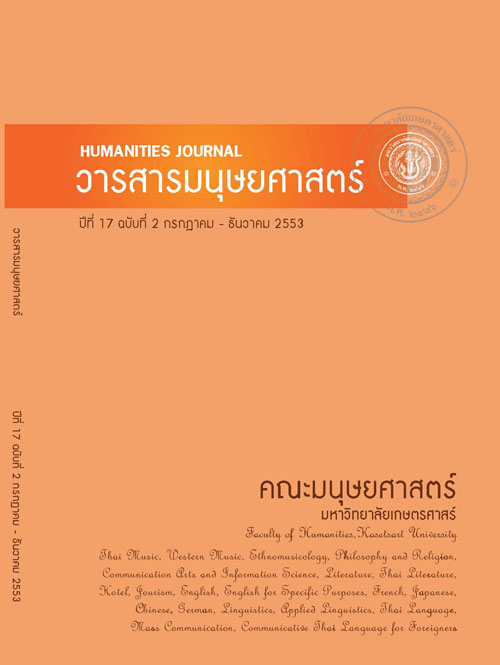การศึกษาเปรียบเทียบนิเวศวิทยาในพุทธปรัชญากับนิเวศวิทยาแนวลึกตามทัศนะของอาร์เน แนสส์
Main Article Content
Abstract
การวิจัยครั้งนี้มีวัตถุประสงค์เพื่อ 1) ศึกษานิเวศวิทยาในพุทธปรัชญา 2) ศึกษานิเวซวิทยาแนวลึกตามทัศนะของอาร์เน แนลส์ 3) เปรียบเทียบนิเวศวิทยาในพุทธปรัชญากับนิเวศวิทยาแนวลึกตามทัศนะของอาร์เน แนลส์และการประยุกต์เพื่อการอนุรักษ์สิ่งแวดล้อม
ผลการวิจัยพบว่า นิเวศวิทยาในพุทธปรัชญาเน้นทั้งระบบคิดและระเบียบในการครองชีวิตที่ดีงามต่อการสัมพันธ์กับสรรพสิ่งทางธรรมชาติ มองสรรพสิ่งว่าต่างดำเนินไปอาศัยกันอย่างสหกรณ์คือการกระทำร่วมกันแบบองค์รวมตามกฎธรรมชาติหรือกฎนิยาม 5 และค่างก็ตกอยู่ภายใต้กฎไตรลักษณ์หาตัวตนที่ยั่งยืนไม่ได้ ดังนั้น มนุษย์จึงต้องมีความเข้าใจที่ถูกต้องหรือมีสัมมนาทิฏฐิ และดำเนินตามหลักพุทธจริยธรรมมีศิลหรือวินัยด้วยเท่าที่มิตรภาพต่อกัน ขณะเดียวกันก็เพิ่มคุณภาพชีวิตด้วยศีล สมาธิและปัญญา และเป้าหมายสูงสุด คือ การประจักษ์แจ้งถึงความเป็นอนัตตา ซึ่งทำให้มนุษย์คลายความเห็นแก่ตัวและคลายการมองสรรพยสิ่งรอบตัวที่จะนำมาบำรุงบำเรอตนเอง หรือนิพพาน ซึ่งเป็นรูปแบบแห่งการสำนึกทางนิเวศที่หนั่งโยงสรรพสิ่งทั่วสากล
ด้านนิเวศวิทยาแนวลึกพบว่า มีทัศนะที่มุ่งเน้นกระบวนการเปลี่ยนแปลงการมองโลกและชีวิตโดยตระหนักว่ามนุษย์เป็นหนึ่งเดียวกับธรรมชาติในระบบนิเวซ จึงต้องมีปทัสถานทางจริยธรรม มนุษย์ไม่ควรไปรุกรายและทำร้ายธรรมชาติ ควรอยู่ร่วมกับธรรมชาติอย่างกลมกลืน เพราะสรรพสิ่งมีคุณค่าในตัวเองและผูกพันเป็นข่ายใยหนึ่งเดียว นั่นคือ เน้นให้มีประสบการณ์ที่เกิดขึ้นอย่างฉับพลันทันที ซึ่งเป็นการรู้แจ้งต่อสัจธรรมความจริงแท้ของสรรพสิ่ง รวมทั้งการบูรณาการทฤษฎีทางวิทยาศาสตร์และหลักนิเวศวิทยา แต่ทั้งสองวิถีทรรศน์ต่างตระหนักถึงการอนุรักษ์สิ่งแวดล้อมและระบบนิเวศ โดยปรับแนวคิดและการกระทำที่ถูกต้องต่อธรรมชาติ งดเว้นการทำลายสิ่งมีชีวิตอื่นๆ และตักตวงจากธรรมชาติ มนุษย์ต้องพัฒนาจิตใจที่พร้อมด้วยปัญญาและประสานผลประโยชน์ทุกสิ่งด้วยกันทั้งปัจเจก สังคมและระบบนิเวศ
A Comparative Study in Ecology of Buddhist Philosophy and Deep Ecology through Arne Naess’ Perspective
Praves Intongpan
The objectives of this research were 1) to study ecology in Buddhist philosophy, 2) to study the deep ecology through the perspective of Arne Naess, 3) to compare the ecology of Buddhist philosophy and deep ecology through Arne Naess, perspective and apply both concepts to the preservation of the environment.
It was found that ecology in Buddhist philosophy emphasizes both systematic thought and rules or right living in relation to all things in nature. It regards all things in nature to be organically interdependent acting holistically according to the laws of nature, or the five aspects of natural law which are controlled by the law of the three characteristics, and are non-self (Anatta). Human beings therefore must have the right view, or Sammaditthi, and conduct themselves in accordance with Buddhist morality, or discipline, acting with friendship to all things. At the same time, human beings can develop the quality of life through precepts, meditation, and wisdom and attain the highest goal of life, clear realization of non-self, by which they are relieved of selfishness and liberated from seeking to recruit all the things they see about them to the service of self. This is Nirvana, which is the form of ecological awareness that embraces all things in the universe.
Deep ecology, for its part, aims to change the view of the world and of life
through the realization that human beings are one with nature in the ecosystem. Thus, they must have ethical standards. They must not exploit or destroy nature but live in harmony with nature because all things have intrinsic value, and all are interconnected in a unity.
The emphasis is thus on experience of the essence and nature of things, and this is called clear realization of the true self, or the ecological self.
As to differences between the two, Buddhist philosophy explains all nature on the basis of the Buddha’s Enlightenment. Deep ecology, on the other hand, proceeds through practices to the experience of truth, or intuition, which is a sudden insight into the truth of the all and the integration of theories of the science and of ecology. Yet both concepts realize the importance of preservation of the environment and the ecosystem through change to proper thought and action with regard to nature, refraining killing all living things and exploiting nature. Human beings must develop their minds and wisdom for the benefit of all: the individual, society and the ecosystem


